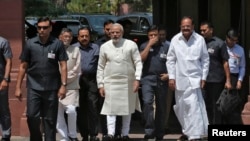India's new prime minister is urging lawmakers to stop "politicizing" rape and instead work together to ensure women's safety.
In his first speech to parliament Wednesday, Narendra Modi said "respecting and protecting women should be a priority of the 1.25 billion people in this country."
His remarks come just weeks after two teenage cousins were gang raped and killed, their bodies hung from a tree in the Baduan district of northern Uttar Pradesh state. Police failed to file a complaint or take action until villagers protested.
In the days since the May 28 attack, various politicians including Uttar Pradesh's Chief Minister Akhilesh Yadhav have made controversial statements on the issue of rape. When asked about a rise in rape cases in the northern state, Yadhav retorted to journalists "but you are safe, aren't you?"
And this week, the home minister of the western Indian state of Maharashtra, R. R. Patil reportedly said obscene images of women in advertisements were to blame for an increase in rapes. Another Indian minister insinuated that rapes happen accidentally.
On Wednesday, Prime Minister Modi made his first public comments on the issue since the girls' rape and killing -- saying politicians were "playing with the dignity of women" when they make such remarks.
Modi told lawmakers, "all these incidents should make us introspect." He said "the government will have to act" and the "country won't wait and people won't forget."
Violence against women has received increasing attention in India since December 2012 when a 23-year-old woman died after being brutally gang-raped on a New Delhi bus.
The attack sparked huge protests across India and prompted the government to adopt tougher punishments for men who attack or harass women.
In his first speech to parliament Wednesday, Narendra Modi said "respecting and protecting women should be a priority of the 1.25 billion people in this country."
His remarks come just weeks after two teenage cousins were gang raped and killed, their bodies hung from a tree in the Baduan district of northern Uttar Pradesh state. Police failed to file a complaint or take action until villagers protested.
In the days since the May 28 attack, various politicians including Uttar Pradesh's Chief Minister Akhilesh Yadhav have made controversial statements on the issue of rape. When asked about a rise in rape cases in the northern state, Yadhav retorted to journalists "but you are safe, aren't you?"
And this week, the home minister of the western Indian state of Maharashtra, R. R. Patil reportedly said obscene images of women in advertisements were to blame for an increase in rapes. Another Indian minister insinuated that rapes happen accidentally.
On Wednesday, Prime Minister Modi made his first public comments on the issue since the girls' rape and killing -- saying politicians were "playing with the dignity of women" when they make such remarks.
Modi told lawmakers, "all these incidents should make us introspect." He said "the government will have to act" and the "country won't wait and people won't forget."
Violence against women has received increasing attention in India since December 2012 when a 23-year-old woman died after being brutally gang-raped on a New Delhi bus.
The attack sparked huge protests across India and prompted the government to adopt tougher punishments for men who attack or harass women.





